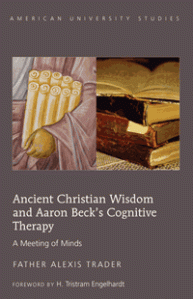Two Kinds of Stillness: Be Still and Know That I am God
 The sublime task of the spiritual life is expressed concretely in the words of the Psalmist. Interestingly enough, the Septuagint word for stillness employed in this verse, σχολάσατε, is not the familiar root for hesychasm with images of stillness, quiet, and solitude of a hermit monk, but the Greek root for the English word school with the connotations of setting aside day-to-day tasks in order to listen and garner knowledge by sitting like Mary at the Master’s feet. In other words, there are two kinds of stillness in the Christian life, both of which are important: a preparatory stillness (σχολή) of setting aside our daily tasks and devoting ourselves to active prayer that is needed to enter the stillness (ἡσυχία) of watchfulness described in books such as The Philokalia.
The sublime task of the spiritual life is expressed concretely in the words of the Psalmist. Interestingly enough, the Septuagint word for stillness employed in this verse, σχολάσατε, is not the familiar root for hesychasm with images of stillness, quiet, and solitude of a hermit monk, but the Greek root for the English word school with the connotations of setting aside day-to-day tasks in order to listen and garner knowledge by sitting like Mary at the Master’s feet. In other words, there are two kinds of stillness in the Christian life, both of which are important: a preparatory stillness (σχολή) of setting aside our daily tasks and devoting ourselves to active prayer that is needed to enter the stillness (ἡσυχία) of watchfulness described in books such as The Philokalia.
Both kinds of stillness call for humility. In the first case, humility is manifest by a willingness to turn away from daily cares that often define our lives in order to devote ourselves to seeking God and in the second case, humility is manifest at an even more refined level of turning away even from those thoughts that tell us who we are and what we feel in order to reach the One Who is beyond all thought and feeling, yet the true desire of every human heart. Too often our attempts at prayer have little to do with either type of stillness. We neither leave aside the cares of daily life nor even turn away from a swarm of thoughts, but instead allow what we label as prayer to devolve into a presentation of a laundry list of our needs and wants rather than a clearing of the mind and a wise reordering of our priorities stemming from genuine repentance and communion with God.
The teachings of Elder Sophrony are helpful in putting prayer and stillness into a proper perspective. According to Elder Sophrony, “The total regeneration of the fallen man into the ‘new’ man is accomplished in three stages: The first, the initial, is the stage of the calling and inspiration towards the present battle. The second is the stage where the ‘perception’ of Grace is withdrawn and man is experiencing God-forsakenness…And the third is where the perception of divine Grace revisits and man holds on to it.”
It is in this second stage where the spiritual battle is fought. According to the Elder, “Initially one receives the Lord’s Grace, then Grace recedes and man goes through the Lord’s discipline. Everyone must go through this discipline. Otherwise if he receives Grace without the necessary discipline, he may be harmed and may be eternally condemned. One must go by humility. . . The essence of God-forsakenness is to prove that we are still immature; that we have not yet reached the end of the road; that we must drink from the cup He has drunk unto the end.”
This second stage, if it is to be fruitful and lead to communion with God, requires the persistent practice of both kinds of stillness, even when leaving aside our daily tasks seems to serve no purpose, even when leaving aside our cherished thoughts makes our emptiness seem even more hollow still. For persistence in stillness when grace seems far off makes us aware that we are not God, that we are not the master of our own universe or the primary instigator of our own salvation. And in so doing, we become more humble and closer to God. This is demonstrated most clearly in today’s Gospel of the Prodigal Son. The prodigal is showered with gifts only after he humbles himself by recognizing his pitiable state and returns to the loving arms of his father. The other son, indignant because he chooses to rely upon his own righteousness, fails to recognize the true path of sonship which is humility and self-emptying. In some ways, this son is much like the Pharisee in last week’s Gospel.
The task of Great Lent is a microcosm of our entire spiritual journey. As Fr. Stephen Freeman writes in his blog, Glory to God for All Things, “As we approach God we are told to walk slowly, and finally, to stand still. More than ‘standing’ still, we are told to ‘be still.’ The calmness and silence of such stillness refers to the noise of our own reason and emotions. The inner conflict produced by life in the world is easily projected onto the screen of the universe, yielding an imaginary God. Only true stillness can allow the projection to dissipate.” Then, like the Prodigal, we can truly come to ourselves, see what matters, and ultimately discern where we need to go: to our Heavenly Father Who can be met by abiding in the two kinds of stillness that lead to the unique feasting of Kingdom of Heaven, in a world where joy, compassion, and love reign supreme.




One of two the most important earthy men in my life were my Grandad who constantly was teaching me to listen (in order to hear) and old retired military man in soviet(at those days) Russia who every day would come out to sit on a bench and treated me as a proper Human, not just a child-girl. He would take his eyes up to the sky and say just few words, one or two, but its the way how he woud say, pointing to the wild geese for example flying under our head “Just look at them!”…Nothing else was said but I watched, I saw in a true way, absorbing that flight of birds in details.
Just like with my Grandad we were laying down with ears against the dirty soil full of spring smells, trying to hear how grass coming through, trying to hear everything in everything. Both of these men never told me about God, I didn’t know the word “Jesus” even. But I knew Him in every little thing that surrounded me. The most important lessons in my life. How wise the most important things are hidden in the most simple ones. Takes ages to return to that simplicity…
I almost forgot about it when I started my journey after I ‘ve read books of Metropolitan Anthony of Sourozh. And that beautiful episode with old lady knitting before the face of God…who after have received advice from Fr. Anthony do not say a word but just BE before the face of God at last after 14 years of practicing Jesus Prayer “heard” a Presence.
she said “I felt so quiet because the room was so peaceful. There was a clock ticking but it didn’t disturb the silence, its ticking just underlined the fact that everything was so still and after a while I remembered that I must knit before the face of God, and so I began to knit. And I became more and more aware of the silence. The needles hit the arm-rest of my chair, the clock was ticking peacefully, there was nothing to bother about, I had no need of straining myself, and then I perceived that this silence was not simply an absence of noise, but that the silence had substance. It was not absence of something but presence of something. the silence had a density, a richness, and it began to pervade me. The silence around began to come and meet the silence in me. All of a sudden I perceived that the silencewas presence. At the heart of the silence there was Him who is all stillness, all peace, all poise.”
Thank you for these beautiful passages that are fine examples of that second stillness that is full and filled by the One Who fills all things.